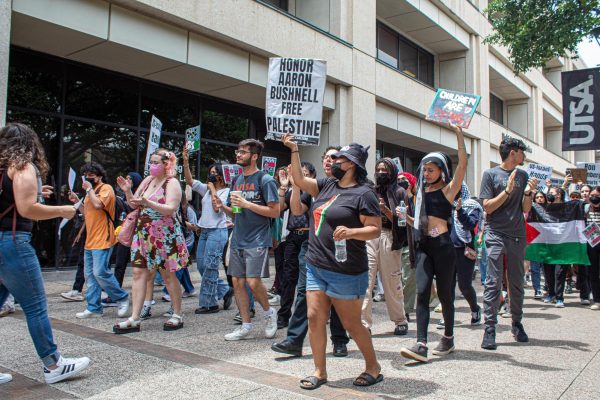Hispanic Excellence: Rosie Castro
Mother and lifetime San Antonian Activist
October 12, 2021
Born in 1947 to an immigrant mother, Rosie Castro has dedicated her life to activism and engagement in the political sphere.
Chronicling her life, Castro began by telling her mother’s struggle as a Mexican immigrant and describing the person she grew up with.
“My mother was an immigrant who came over with her sister,” Castro said. “Her sister was four, she was about six, they had lost both parents in Mexico. So they were split up when they got here. My mother went to about third grade [in school] and [then] she was a maid and a cook.”
In high school, Castro was involved with several clubs, but became truly engaged when she went to college. Castro attended Our Lady of the Lake University in San Antonio where she majored in Spanish with a minor in English.
“When I went to Our Lady of the Lake there were a lot of changes that needed to be made for Mexican-Americans,” Castro said. “At the time there was an 80% drop out rate and a lot of it had to do with the fact that we didn’t have bilingual education.”
After identifying a clear problem in the university community, Castro explained how she got involved more deeply with the student organizations.
“In college I got very involved because I understood that if you wanted to make changes, you needed to have people who represented you, and I [was] involved with Young Democrats of America,” Castro said. “At Our Lady of the Lake, the rule was if you had one political organization] you had to have the other, so I also helped start the Young Republicans club there.”
Not only was Castro heavily involved in university life, but she also expanded upon the political work that she got into around the same time.
“College is where I really got active with the political community,” Castro said. “At the time there were only five Mexican-Americans from San Antonio elected in anything — city council, county commissioner, state representative, etc. So we understood there was a need to elect more people because in a democracy if you are not at the table, nobody makes policy for your vote. Right away I got involved with voter registration with the Democratic party.”
Despite her participation in the Democratic party in college, Castro acknowledged the areas where the party fell short in policy and representation. “As time went on I could see clearly that one of the problems with the Democratic party was that they did not have a message of having representation of people of color. In fact, as they redistricted they tried to make sure we couldn’t get elected,” Castro said. “I joined with several young women and men and joined the Raza Unida party because we wanted to address the issues that were not being addressed in our communities throughout Texas.”
Founded in 1970, the Raza Unida Party sought to bring greater economic, social and political self-determination to Mexican-Americans. The party came at a time when Mexican-Americans had little power in local politics, despite being the majority of the population in several localities.
Castro expanded upon the issues that faced Mexican-Americans, the brutality inflicted upon them as well as why she felt it needed to be corrected.
“The 1970’s were really bad years for Mexican-Americans,” Castro said. “There was a lot of police brutality, hunger, malnutrition and a lot of laws that kept people back. Consequently, there was the development of a lot of alternative institutions that had to be our focus because obviously the legal system did not help us. There had been a lot of intimidation at the polls. In the 70’s there had been a great deal of police brutality particularly by the Texas Rangers, so we all felt that we needed to address that by electing people who would change that.”
Castro recalled a particular instance of extreme abuse against Mexican-Americans that further pushed her to get into politics.
“There was just no reason for what happened in Texas,” Castro said. “Mexican-Americans were treated as ‘enemy aliens,’ although many [of them had] lived here before anyone else did. The treatment of Mexican-Americans was brutal and savage. In the 70’s we had a young man, Santos Rodriguez, who was 12 years old, that the Dallas police played Russian roulette with and killed. His brother was in the seat next to him and they hadn’t done anything. So it was one case after another and I got very involved after that.”
At twenty-three years old Castro ran for city council, where she came in second in a running with four other candidates. Castro explained why she decided to become more involved in the political sphere and mentioned the important part that education had in the success of marginalized people.
“Probably the biggest reason that I felt it was important to get involved was because of prejudice, discrimination and bias aganist Mexican-Americans, particulary in San Antonio,” Castro said. “I grew up seeing many examples because my mother and I went through it. The other reason was education; my family and I were big believers in education, and we still are. Education has a way of transforming things, so people can work their way out of poverty. I knew that Mexican-Americans were not dumber than anyone else, so I knew that if we could have the right educational opportunities we would be able to compete and have our families lifted out of poverty.”
Keeping with the sentiments about the importance of education, Castro provided insight into areas in the state where prejudice against people of color shines through.
“When you look at all the colleges and the majority of the universities, with the exception of Texas A&M, all of them have Anglo presidents. That doesn’t happen by chance,” Castro said. “It’s this idea that we aren’t smart enough, we aren’t good enough, and no one tries to find good in our Latinx candidates.”
Castro went on to explain how inspiring activists and politicians can get involved. She mentioned the importance of finding a good mentor. In college Castro was mentored by Dr. Margaret Kramer who was very involved in the Democratic party. She also noted that the county is looking for individuals to sit on redistricting committees, as election judges, as well as someone to serve on boards for bond issues. Both of these experiences can provide insight into city and election structure. Finally, Castro expressed how important education and the value of community is for aspiring leaders.
“I think there are alot of things you can do to get involved,” Castro said. “There is a new organization called the Mexican-Americans Civil Rights Institute and it’s only two years old, but it’s capturing all of the history of Mexican-American civil rights. It’s good to look back at that history, so it’s not repeated and find the strategies that might have beaten bad policy in the past, so knowing your history is really important. Of course, being rooted in the community, helping the community through different ways, through non-profits and I think talking to people, talking to folks who are genuine, that you feel have similar policy views always helps.”
Finally, Castro acknowledged why it is imperative to acknowledge the issues happening in your community and why it is important for elected officials to do the same.
“I have never believed in seeing bad and evil things happening and turning your head and saying ‘somebody else should take care of it, not me,’’’ Castro said. “I knew things like discrimination weren’t going to go away on its own. I worked to change the structure that would allow us to elect people that were like us, that cared about the east, west and southside of town and that had the community at heart.”












